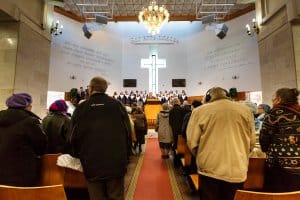Wycliffe Russia relies on a network of churches across its vast country to partner in Bible translation. During COVID-19, it is adjusting its strategies — and turning to that same network to offer help.
“We are trying to be friends to people,” said Alexander Philippov, Wycliffe Russia’s director. “We are trying to say to our partners: Look, we’ve come to you for the help and support. But this is our turn now to help you in any way we can. Feel free to connect. Feel free to come to prayer meetings. Call us.”

During the pandemic, Wycliffe Russia created instructional videos on technical topics, like how to connect on Zoom. They are even offering book recommendations. In the coming weeks, Alex plans to record a few videos on strategic planning, public speech and communication skills.
The organization also has offered several grants of about $4,300 CAD that can be used during the pandemic for community social needs, such as feeding the hungry.
Wycliffe Russia has translation projects in Russia and some of the former Soviet republics. They also work in South Asia and Africa, Alex said.
Networking a Vast Country
Even before the pandemic caused shutdowns and travel restrictions, Wycliffe Russia already was using remote networks and virtual meetings to connect with partnering churches throughout the country, which spans eleven time zones. Their office is located in St. Petersburg, on the country’s far-western edge.

A nomadic group in northwestern Siberia pack their sleds to move farther north for the summer.
“Russia is big, and our office is not,” said Vlada Dibirova, who works in the public relations department and prayer ministry. “We send churches information, news and videos. And also, we constantly contact pastors so as not to lose touch. We pray for them and the church’s needs.”
Any time a Wycliffe staff member visits a church, they try to identify one person who can be their future representative in that region. Representatives speak to church congregations once a month and relay Wycliffe news and prayer needs. Sometimes the representatives even recruit new representatives during those visits.
“One representative said he has visited all but two of the churches in his region,” Alex said. “We have never been there. But he has gone there, and he is Wycliffe Russia’s representative. We gave some of those guys papers that confirm that they represent the organization, so that people don’t look strangely at them.”
Wycliffe has started two WhatsApp groups with about 20 representatives each, because in Russia the app is used much more than email.
“So that’s about 40 people who on a monthly basis talk about Wycliffe work and God’s mission to the same churches again and again,” Alex said. “That is a tool that we see needs to be implemented for more efficient work. Churches hear the same message and tune up to the same vision we are inviting them into.”
Prayer partners meet together on Zoom once a week. “Every meeting we have a new guest — pastors, friends, our workers, missionaries,” Vlada said. “The main theme is to pray.”

Reindeer driven sleds are a popular means of transportation on the snow-covered plains of northwestern Siberia.
The guest talks about prayer’s impact in their life and in the place they work. “Then we pray together for our country, one region of the country and our needs,” Vlada said. “And the most amazing point in the meeting — at the end we pray the Lord’s Prayer together. It is really amazing.”
Now that this network of representatives and prayer partners has been established, Wycliffe staff members have been able to reduce their travel, Alex said.
“Basically what happens is, you get on a plane and go five hours and you end up in the middle of Russia,” he said. “It’s time-consuming, energy-consuming and costs a lot of money. That is what we are trying to change. We want these representatives to conquer Russia with the same message.”
Online Training Offered
Wycliffe Russia is even taking a Wycliffe global recruitment staple — a Language and Culture Acquisition course (LACA) for prospective staff members — and offering most of it online. The class meets three times a week over 11 weeks, and costs just $20 CAD, far less than the $1,000 or more the same course would have cost in person.
The new approach has been popular, with 54 students enlisting in the course this spring, Alex said.
“That is the largest amount of students I have seen in the recent past for any LACA course, not just Russia,” he said, adding that the online experience has been well-received. People like the flexibility and lower cost.
“We see tendencies that we didn’t see coming, really,” he said. “People are quite serious about the course. They do their homework. They are actively participating in their small discussion groups. They come up with presentations. They talk to each other. They even started an English Club.”
As a second part of LACA online, Wycliffe Russia plans a phonetic course that will take place this fall.
Source: wycliffe.net
Photos by Marc Ewell

